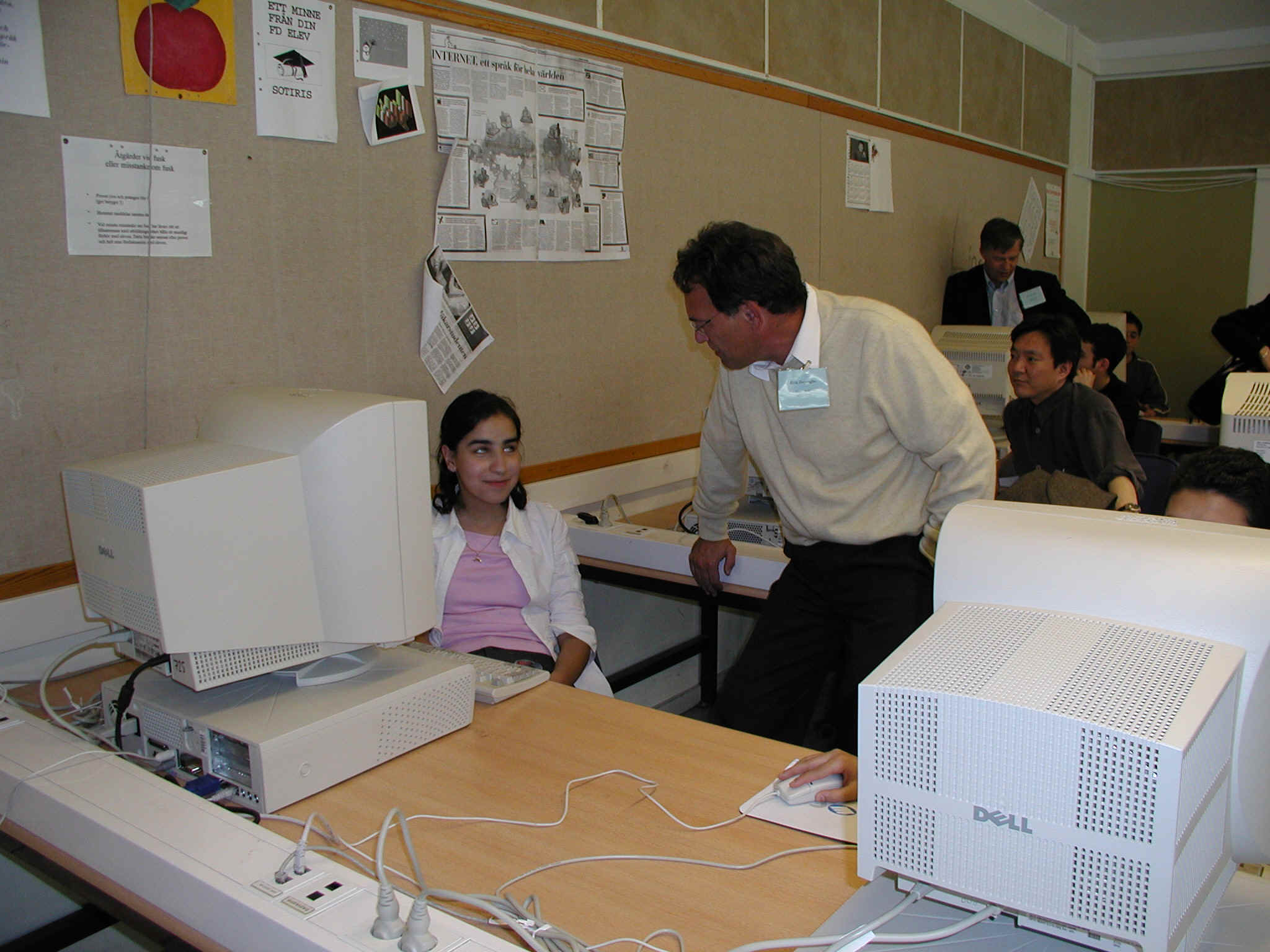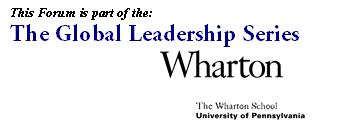The European Forum
Stockholm, Sweden
April 23-27, 200
In facing a multitude of diverse issues, the
participants of The International Forum bring different perspectives from
their own experience, their industry and their part of the world.
Each adds to the process, and by working together, participants
learn from others’ questions and how they go about resolving them.
The four days of The International Forum encompass a wide range of
topics. Participants will
find some more important to them than others, but the meaning is not to be
found so much in the topic itself, but in how it relates to other topics.
It is the very essence of top management’s responsibility and
leadership that it is able to integrate so many different forces and
factors in approaching the issues and addressing the opportunities or
problems they present.
The Forum’s process is designed to encourage this. Participants will discover more value in the links they can make among the many subjects discussed at the Forum than they will find in the single sessions of the Forum. They will learn much from watching others make these connections as each participant has a unique way of learning and processing information. The Forum recognizes this by not delivering information and ideas in pre-organized packages. While the agenda is set out in sessions, the Forum is designed for participants to select for themselves those ideas and insights they want to use as they work with others in addressing the issues.
Europe, Organizations, and the Progress of Globalization
The International Forum in Stockholm will address
many issues relevant to the leaders of global businesses but from the
European perspective. The
Forum agenda will address two key themes throughout the four days, though
other themes may emerge as well through discussion and experiences as
participants bring forth their own perspectives and questions
1.
What is Europe? How
will it emerge as a political, economic and geographical unit in the
future? What are the
implications for global corporations as they consider their strategies for
both Pan European and local operations?
2.
The changes brought about by globalization and the information
revolution are forcing all enterprise--in government, business,
universities who are non-government organizations, to organize differently
than they have in the past. Success
in doing this is critical to their survival, yet the task is extremely
complex, requiring the consideration of a changing social structure, new
values, different expectations and the implications of continuing new
technologies in information communication and transportation.
We can probably expect challenges to our assumptions about the
nation state, role of government, democracies, corporations, quality of
life, human dignity and the environment. In what ways will corporations
change so as to address the new issues and demands of the societies in
which they do business? 
How will they:
|
Become organizations to which people want to belong | |
| Organizations that get things done in the information era | |
| Change from organizational structures that command and control to those that sense and retrieve; | |
| Cope with the convergence of regulation standards, legal systems and capital markets while recognizing and working effectively with local difference | |
| Use the Internet and its related technologies? | |
| Deal with the increased risks to individuals and the organization brought about by growing instability in the world, global terrorism, conflicting values, further decline in developing countries and clashing civilizations. |
Europe and the Nation State
As the nation states of Europe confront their future together in the European Union, a central question remains: How do they see their own distinctive national characteristics as part of this united and integrating effort and what do they view as their responsibility with respect to the rest of the world?
Historically, France, Germany, Britain, Italy, the Netherlands and the Scandinavian countries have been noted for the differences in the way they approach the issues of governance, free markets, security, regulation, technology and the social safety net. The path towards integration often seems obstructed by ideological differences about the degree of socialism or free markets, or fear of centralized power and bureaucracy.
How will a united Europe of the future reflect the particular characteristics and aspirations of its member states or nations? For example, how will France’s centrally-planned approach to developing technology, building industry and educating leaders work alongside the "laissez-faire" environment of independent British shopkeepers? Can the development of the EU be reconciled with the desire of some of its members to retain their (absolute) sovereignty?
How will the EU respond to calls from Turkey, Central and Eastern
Europe for increased market access? Will it be reluctant to deal on the
grounds that this might disrupt the delicate and fragile architecture of
the EU’s own vision of Euro-federalism?
The "single market" continues to evolve, and the products and services of its Pan-European companies cross the traditional cultural boundaries of their nation states, while more of its people move and live in places where they were not born. Will Europe become a "melting pot", like America, where cultural origins are less important than citizenship in a federal state? How will it manage its growing cultural diversity and immigration flows from outside Europe?
Today, as Europe enters the 21st century, aspiring to be a unified community governed in part by a central authority and bureaucracy in Brussels, will it be able to keep pace with a competitive world? Will its internal market and domestic competition give it the ability to compete with other major blocs in the world? Will it avoid a fate similar to China’s in the 16th century?
| As European companies integrate some of the ideals of the global marketplace and the strong influence of shareholder capitalism, what form of corporation will evolve that reflects both the values and principles of their civilizations, as well as the benefits of this open model? |
| How will the relationship of the global corporation and the nation state evolve? |
| As the world becomes more regional, will the role of the nation state be replaced by other entities and regionalized powers or something else? |
Europe’s Relationship to the World
At the turn of the 20th century, and again in the latter half of the same century, Europeans found themselves in cooperation and alliance with each other. Today Europeans recognize how that changed and how their rivalries led to two great world wars in the last century. There is a great sense of responsibility now to preserving peace and order.
| Will associations and organizations such as NATO, WTO, IMF, UN and EU be more effective than the nation state in addressing political, social and security challenges? Will they be effective in dealing with asymmetric threats and global terrorism, or is some different model necessary? |
| What does Europe see as its role with respect to the Balkans? |
In the past decade, globalization has generated increased levels of wealth and reduced poverty levels amongst developed countries and the developing nations who have opened to their economies to world trade. However, the poverty levels in undeveloped and un-globalized countries (characterized mostly by sub-Saharan Africa) have increased in the 1990’s.
| What does Europe see as its responsibility in resolving the issues of inequality between the developed and developing world? |
Globalization
Globalization today is characterized more by the actions and nature of the global corporation than by the nation state. Leaders of corporations are not really elected by their constituents; the corporation is accountable to no-one in particular (though this varies by company and culture); it can move more rapidly across the world to establish alliances, agreements and local presence than any entity before it; it benefits from the infrastructure, education and healthcare systems of the communities in which it operates; yet is not bound to contribute back to them, (except through taxes). The strength of the global company has been its flexibility, its independence and its single focus on producing goods and services for profit. In this it has been immensely successful, but at the same time it has unleashed the counter-forces in its future.
| What are the overriding forces for globalization? What role should nation states, societies, special interests, non-government organizations, artists and scientists play in fashioning the global civilization of the future? |
| How will the relationship of the global corporation and the nation state evolve? |
The anti-globalization movement of the past ten years is a fragmented force of dissatisfaction and distrust. It has been aimed at the global corporation and those with capital or who influence the flow of capital. There are many elements to it including – those concerned for the environment, those concerned about human rights, those concerned that shareholder capitalism has made very few, very rich while not solving larger global issues and those who just need something to be angry about.
As one writer posed…"this is counter-capitalism. The new wave of political activism has coalesced around the simple idea that capitalism has gone too far. It is as much a mood as a movement, something counter-cultural. It is driven by the suspicion that companies, forced by the stock markets to strive for ever greater profits, are pillaging the environment, destroying lives and failing to enrich the poor as they promised. And it is fueled by the fear that democracy has become powerless to stop them, as politicians are thought to be in the pockets of companies and international political institutions are slaves to a corporate agenda" (James Harding, Financial Times, October 2001)
| Is this true? If not, how did the global corporate community let public opinions get this far? Should it be ignored or addressed? If it is ignored, how will this influence the stability of the global marketplace and the effectiveness of the global company in it? |
More Information:
The European Forum Agenda and Biographies Book
Published Resources
